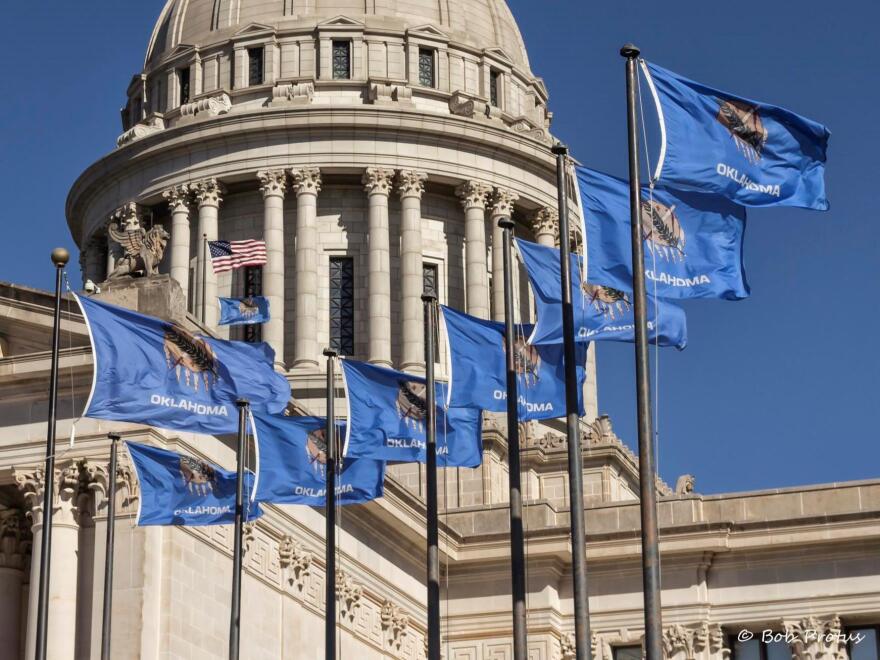Legislators returned to the State Capitol on June 13th for the start of the third special session, called to consider repeal of the grocery sales tax and reduction of the state individual income tax rate. The extraordinary session ended when the House of Representatives adjourned sine die with leaders of the two houses disagreeing over the results.
TRANSCRIPT
Capitol Insider sponsored by the Oklahoma State Medical Association, physician members who devote more than 11 years of higher education and 10,000 clinical hours in study to provide care for all Oklahomans. More at okmed.org.
Dick Pryor This is Capitol Insider - taking you inside politics, policy and government in Oklahoma. I'm Dick Pryor with Quorum Call publisher Shawn Ashley. In the last week, the legislature has been in two special sessions. One, the legislature called. One, the governor called. Looking at these special sessions from inside the Capitol, Shawn, what three words would you use to describe what you have seen?
Shawn Ashley: (chuckles) That's a really good question. And I think I would say confusing, difficult, and dysfunctional.
Dick Pryor: (chuckles) Okay. Let's take them in order. Why do you call what you're watching confusing?
Shawn Ashley: Well, let's start with the third special session that Governor Stitt called to pass two inflation relief measures - repeal of the state sales tax on groceries and an income tax reduction. Now, the House passed five bills that temporarily eliminate or permanently repeal the sales tax on groceries, and two, that reduce the individual income tax. And then they adjourned Sine Die before the Senate had an opportunity to take up those bills. So now the House and Senate disagree on whether the Senate can even take up those bills. The House says the Senate can because its Sine Die adjournment is contingent on, as they say, the clerk's desk being clear and currently the clerk's desk remains open, according to the House. The Senate says it cannot because the House is no longer in session and cannot receive back any of the bills the Senate passes and then send them on to the governor.
Now, to their credit, the Senate and House did pass seven bills, appropriating more than $70 million of the state’s share of the federal American Rescue Plan Act funding it has received. And they did that in the second special session, which they had called. That money will go to programs to expand Oklahoma's health care workforce, for water infrastructure, and a program to benefit nonprofits in the state. Those bills are now on the governor's desk.
Dick Pryor: Difficult is an interesting word choice. Explain that one.
Shawn Ashley: Well, first of all, they are being difficult with one another. Disagreeing, and it does not seem they currently are on a path to reconcile their differences. And that makes it difficult for the government process to work. Finally, they're making it difficult for the public, for you and I and our listeners to understand how the legislative process works. The House claims they have done their work, and now it's time for the Senate to do its job. But the Senate says there are legitimate legal questions about whether they can move forward, and it seems like neither is going to budge from their position.
Dick Pryor: And your last word for what is going on between both houses and the governor right now is dysfunctional. That one seems rather obvious.
Shawn Ashley: I think so. Back on May 27th, House Speaker Charles McCall said that the governor had made a mistake by calling a special session when there was not an agreement on how to move forward. On Wednesday, Senate President Pro Tem Greg Treat said there was not an agreement between the Senate, the House and the governor to move forward on the bills which the House passed and has now passed on to the Senate for possible consideration, which the Senate says it can't do.
Governor Stitt, for his part, is at least optimistic. He told me Thursday, “I'm going to try to let tempers calm down a little bit between the House and the Senate before deciding how to move forward.” Stitt still wants lawmakers to pass inflation relief. The House and the Senate say they want to consider inflation relief, but the question is when, if ever, they will be able to do so together.
Dick Pryor: While Republicans have been unable to get on the same page regarding the special session on taxes, Democrats proposed expanding the ARPA session to consider changes in Oklahoma's lax gun regulation laws. Adding that to the special session agenda required signatures from two thirds of the members of each chamber and went nowhere. Is adding that to the call still possible?
Shawn Ashley: Is it possible? Yes. Democrats have until the end of the second special session to get the signatures that would put their proposals on the agenda. Is that likely? Probably not. They need the signatures of Republicans who largely voted en masse for some of the proposals, like permit-less theory that the Democrats want to repeal, and I really don't see that happening.
Dick Pryor: Shawn, all of this is happening in the context of an election year. Members cannot be too happy about doing legislative work when they want to be out campaigning.
Shawn Ashley: I don't think they are. And that was evident during the House floor proceedings when more than one presiding officer encouraged members to vote more quickly so they could complete their work and get back out on the campaign trail. The primary election, of course, is just over a week away.
Dick Pryor: Thanks, Shawn.
Shawn Ashley: You're very welcome.
Dick Pryor: If you have questions, e-mail them to news@kgou.org or contact us on Twitter @kgounews and @QuorumCallShawn. Until next time, with Shawn Ashley, I'm Dick Pryor.






